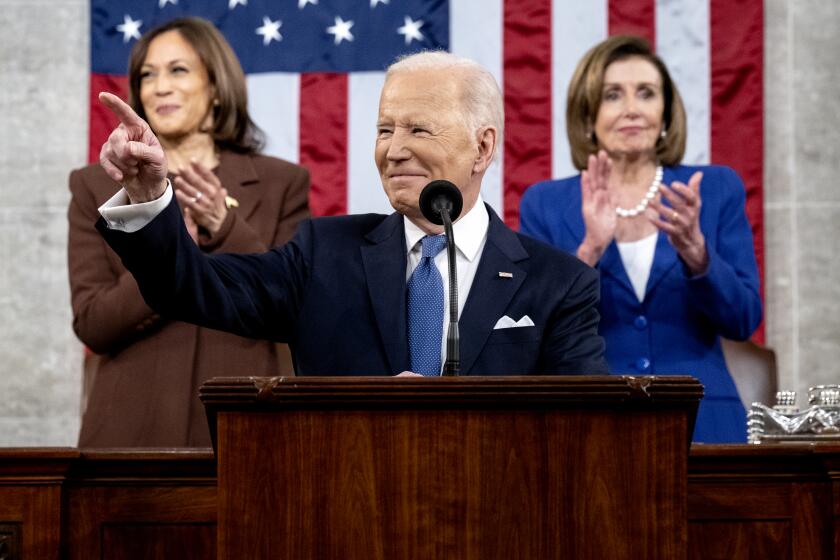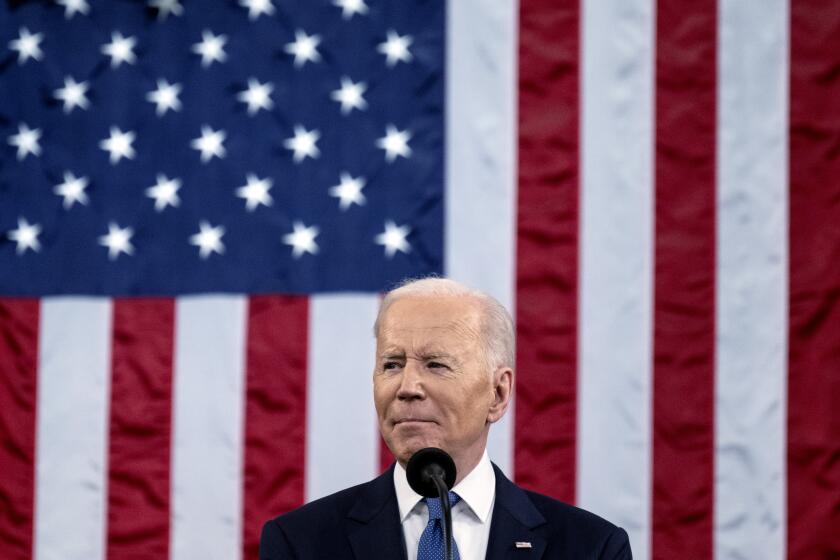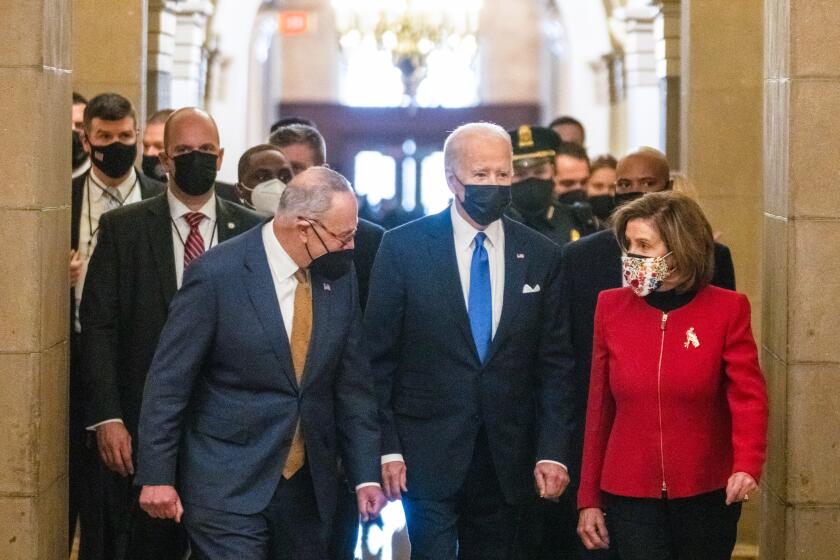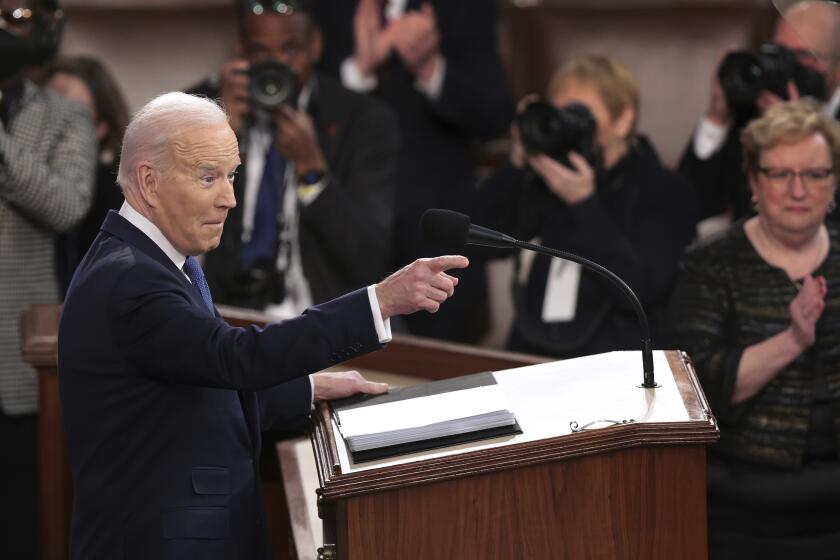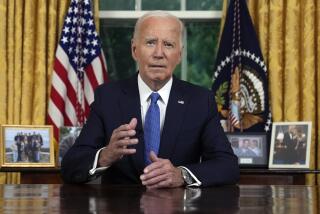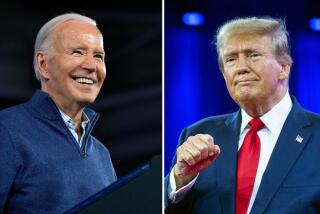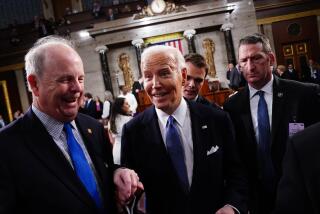Biden hails democracy and decries Putin for Ukraine invasion, as he pledges to fight inflation

In his State of the Union speech a year after taking office as the un-Trump, President Biden faces an American public that wants far more.
- Share via
WASHINGTON — President Biden on Tuesday evening heralded the power of democracy in his first State of the Union address, praising the West’s response to Russian leader Vladimir Putin’s “premeditated and unprovoked” war with Ukraine while seeking to convince Americans that he has plans to combat spiking inflation and the COVID-19 pandemic at home.
Coming amid colliding geopolitical and domestic crises — a stalled legislative agenda, rising inflation, declining public support, a two-year pandemic and Russia’s invasion of Ukraine — Biden sought to reassure the world that the U.S. was doing all it could to punish Putin in the hopes of convincing him to stop the conflict, the most serious threat to Europe since World War II.
In addition to stiff economic sanctions imposed on Moscow over the last week by the U.S. and its allies, Biden announced he would ban Russian aircraft from American airspace, joining European nations that have already taken that step. The Justice Department will also pursue Russian oligarchs in Putin’s inner cycle.
“Tonight, I say to the Russian oligarchs and corrupt leaders who have bilked billions of dollars off this violent regime: No more,” Biden said to bipartisan, rapturous applause in the House chamber of the U.S. Capitol. “We are joining with our European allies to find and seize their yachts, their luxury apartments, their private jets. We are coming for your ill-begotten gains. He has no idea what’s coming.”
The president reiterated that several rounds of sanctions were designed to inflict pain on the Russian economy because a “dictator invading a foreign country has costs around the world.” Seeking to underscore the importance of a unified Western response to the crisis, Biden described the conflict as a “battle between democracy and autocracy,” one that the U.S. sought to avert by repeatedly warning the world about Putin’s plans to attack.
In his State of the Union speech a year after taking office as the un-Trump, President Biden faces an American public that wants far more.
“We countered Russia’s lies with truth. And now that he has acted, the free world is holding him accountable,” Biden said. “Democracies are rising to the moment, and the world is clearly choosing the side of peace and security.”
Hundreds of lawmakers, freshly relieved of pandemic mask mandates and armed with signs of support for Ukraine, cheered when Biden pointed to Oksana Markarova, Ukraine’s ambassador to the U.S., in the House gallery, where she sat with First Lady Jill Biden.
“Let each of us here tonight in this chamber send an unmistakable signal to Ukraine and to the world,” Biden said, drawing a standing ovation from members of both parties.
Biden’s address came amid tighter physical security at the Capitol but fewer COVID-19 precautions.
U.S. Capitol Police this week reinstalled a fence around the Capitol, similar to the one put up after last year’s insurrection, and on Monday Congress’ attending physician lifted a mask requirement on Capitol Hill. The vast majority of members of both parties did not wear masks in the chamber Tuesday night.
Beyond Ukraine, Biden’s wide-ranging speech took on a more partisan tone — and received a more sharply partisan response, including audible heckling from Rep. Lauren Boebert (R-Colo.), among the president’s most ardent Republican critics. He called for lawmakers to send him several bills that stand little chance of passing a closely divided Congress and outlined policies that have little bipartisan support.
The full text of President Biden’s prepared remarks for his first State of the Union address, delivered amid a pandemic, inflation and war.
He touted recent administration successes, such as the COVID-19 stimulus bill known as the American Rescue Plan, a bipartisan infrastructure bill and the nomination of federal Judge Ketanji Brown Jackson to become the first Black woman on the Supreme Court.
Biden tried to carefully thread a needle while addressing the COVID-19 pandemic, praising the declining rates of infection and hospitalization while avoiding declaring victory. He made that mistake in July, just before the Delta and Omicron variants battered the U.S. and the world. As public polling has grown sharply against mask mandates and toward a return to pre-pandemic life, he said “COVID-19 need no longer control our lives.”
“Because of the progress we’ve made, because of your resilience and the tools we have, tonight I can say we are moving forward safely, back to more normal routines. We’ve reached a new moment in the fight against COVID-19, with severe cases down to a level not seen since last July,” he said.
Seemingly mindful of the parents of young children who are not yet vaccinated and continue to worry about exposure, Biden said he would never “just accept living with COVID-19,” adding that widespread testing would be needed to control its spread. He asked Congress to send him funding to maintain the government’s testing regimes.
The biggest political minefield for Biden is rapidly rising inflation, as evidenced by the soaring cost of goods like groceries and gasoline. He took pains to tell Americans he understood their struggle and had a plan to combat inflation and slash the deficit.
“Lower your costs, not your wages,” he said. “Make more cars and semiconductors in America. More infrastructure and innovation in America. More goods moving faster and cheaper in America. More jobs where you can earn a good living in America. And instead of relying on foreign supply chains — let’s make it in America.
Following defeats on big bills, Democrats on Capitol Hill are frustrated with their own leaders and uncertain who will step up to save Biden’s agenda.
“I call it building a better America,” he said.
The Biden administration is in need of a reset, particularly when it concerns the economy.
An NPR/PBS “NewsHour” poll released Friday found that only 36% of respondents agreed with how Biden is handling the economy and 39% approved of his overall job performance. Inflation was the top concern cited.
Iowa Republican Gov. Kim Reynolds, who delivered the GOP rebuttal, criticized Biden for allowing the rise in inflation. She also blamed his foreign policy choices for helping to set the stage for Russia’s invasion of Ukraine.
“Instead of moving America forward,” she said, “it feels like President Biden and his party have sent us back in time, to the late ‘70s and ‘80s, when inflation was hammering our families, a violent crime wave was crashing our cities and Soviet armies were trying to redraw the world map.”
To combat rising prices, the president announced an effort that officials say will help improve the economy by seeking to promote more competition in the ocean shipping market, one dominated by just three global alliances.
The speech comes among a stalled legislative agenda, rising inflation, declining public support and an escalating war in Ukraine
He also reiterated support for pieces of a massive spending bill, once known as “Build Back Better,” that died in December because of the opposition of every Republican and Sen. Joe Manchin III (D-W.Va.), a moderate who expressed concern over the measure’s proposed cost.
Biden asked Congress to send him legislation that includes Build Back Better’s proposals to reduce prescription drug costs, expand child care, tackle climate change and reduce the deficit.
Biden did not refer to the plan — which he once said would define his presidency — by its old moniker, a sign that he hopes to rebrand it as part of a last-ditch effort to pass pieces of his agenda while Democrats retain control of both houses of Congress. The president’s party faces tough odds in retaining control of Congress in the November midterm elections.
Senate Majority Leader Charles E. Schumer (D-N.Y.) told reporters after the speech that there’s “a lot to do” in the coming months, without getting into specifics.
“That’s a good thing,” Schumer said, “because the American people want us to focus on them.”
Times staff writers Erin B. Logan and Nolan D. McCaskill contributed to this report.
More to Read
Get the L.A. Times Politics newsletter
Deeply reported insights into legislation, politics and policy from Sacramento, Washington and beyond. In your inbox three times per week.
You may occasionally receive promotional content from the Los Angeles Times.
